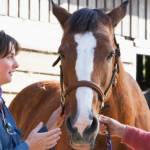Colic in Horses: Bad News, Good News

Colic is fairly common in horses. That’s not news to any horse owner. The bad news is that horses can develop colic due to a long list of causes: overconsumption of grain or fresh grass, blockage of the intestinal tract by parasites or dry, tough-fibered feeds, gas pressure following fermentation of carbohydrates, or consumption of moldy feed or hay. Most of these can be prevented by careful management.
There are also many causes of colic that can occur naturally, regardless of the way a horse is managed. Various section of the colon may become displaced or get trapped by other organs. One piece of intestine can telescope over another section, especially in the area where the large and small intestines join. Mares can develop colic signs after foaling because of a twisted colon. Enteroliths, which are stone-like mineral masses, can form in the intestine, blocking the flow of ingested material. Many colic cases caused by these situations require surgical treatment.
So what’s the good news about colic? The vast majority of cases either resolve on their own or can be successfully treated with pain medication and fluid therapy. According to an article in The Horse, only about 5 to 10% of colic cases are severe enough to require surgery. Even if large sections of the bowel must be removed because of a compromised blood supply, many horses recover and function well following abdominal surgery.
Because an owner can’t determine the severity of a colic case, a veterinarian should be called if a horse shows colic signs that do not resolve quickly (feed refusal, looking at or kicking at the abdomen, rolling, pawing, pale or brick-red gums). Colicking horses may be in extreme pain, and rapid intervention may be the difference between full recovery and a fatal outcome.








